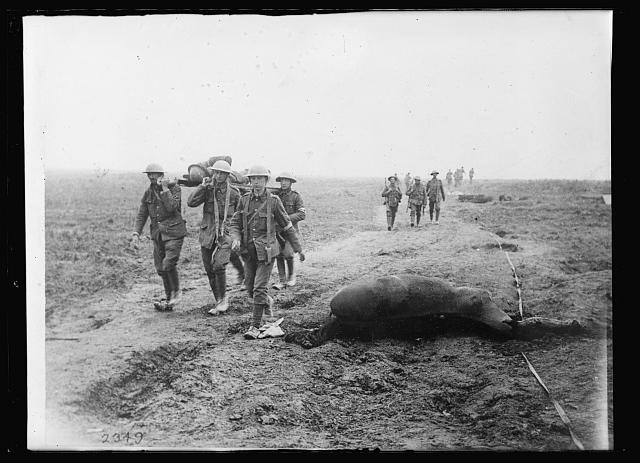TO LET GO OR TO HOLD ON —?
By:
April 14, 2023
A (pro- or anti-) science-, mathematics-, technology-, space-, apocalypse-, dehumanization-, disenchantment-, and/or future-oriented poem published during sf’s emergent Radium Age (c. 1900–1935). Research and selection by Joshua Glenn.

Shall we let go,
and allow the soul to find its level
downwards, ebbing downwards, ebbing
downwards to the flood?
till the head floats tilted like a bottle
forward tilted
on the sea, with no message in it; and the
body is submerged
heavy and swaying like a whale recovering
from wounds, below the deep black wave?
like a whale recovering its velocity and
strength
under the cold black wave.
Or else, or else
shall a man brace himself up
and lift his face and set his breast
and go forth to change the world?
gather his will and his energy together
and fling himself in effort after effort
upon the world, to bring a change to pass?
Tell me first, O tell me,
will the dark flood of our day’s annihilation
swim deeper, deeper, till it leaves no peak
emerging?
Shall we be lost, all of us
and gone like weed, like weed, like eggs of
fishes,
like sperm of whales, like germs of the
great dead past
into which the creative future shall blow
strange, unknown forms?
Are we nothing, already, but the lapsing of
a great dead past?
Is the best that we are but sperm, loose
sperm, like the sperm of fishes
that drifts upon time and chaos, till some
unknown future takes it up
and is fecund with a new Day of new
creatures? different from us.
Or is our shattered Argosy, our leaking ark
at this moment scraping tardy Ararat?
Have we got to get down and clear away
the debris
of a swamped civilisation, and start a new
world for man
that will blossom forth the whole of human
nature?
Must we hold on, hold on
and go ahead with what is human nature
and make a new job of the human world?
Or can we let it go?
O, can we let it go,
and leave it to some nature that is more
than human
to use the sperm of what’s worth while
in us
and thus eliminate us?
Is the time come for humans
now to begin to disappear,
leaving it to the vast revolutions of creative
chaos
to bring forth creatures that are an
improvement on humans,
as the horse was an improvement on the
ichthyosaurus?
Must we hold on?
Or can we now let go?
Or is it even possible we must do both?
— July 1929
In D. H. Lawrence: New Studies (1987) by Christopher Heywood and Paolo Bartoloni, we read that this poem “is far more convincing, i.e. more poetically persuasive, when contemplating the possibility of collapse rather than the possibility of holding on.”
RADIUM AGE PROTO-SF POETRY: Stephen Spender’s THE PYLONS | George Sterling’s THE TESTIMONY OF THE SUNS | Archibald MacLeish’s EINSTEIN | Thomas Thornely’s THE ATOM | C.S. Lewis’s DYMER | Stephen Vincent Benét’s METROPOLITAN NIGHTMARE | Robert Frost’s FIRE AND ICE | Aldous Huxley’s FIFTH PHILOSOPHER’S SONG | Sara Teasdale’s “THERE WILL COME SOFT RAINS” | Edith Södergran’s ON FOOT I HAD TO… | Robert Graves’s WELSH INCIDENT | Nancy Cunard’s ZEPPELINS | D.H. Lawrence’s WELLSIAN FUTURES | & many more.
